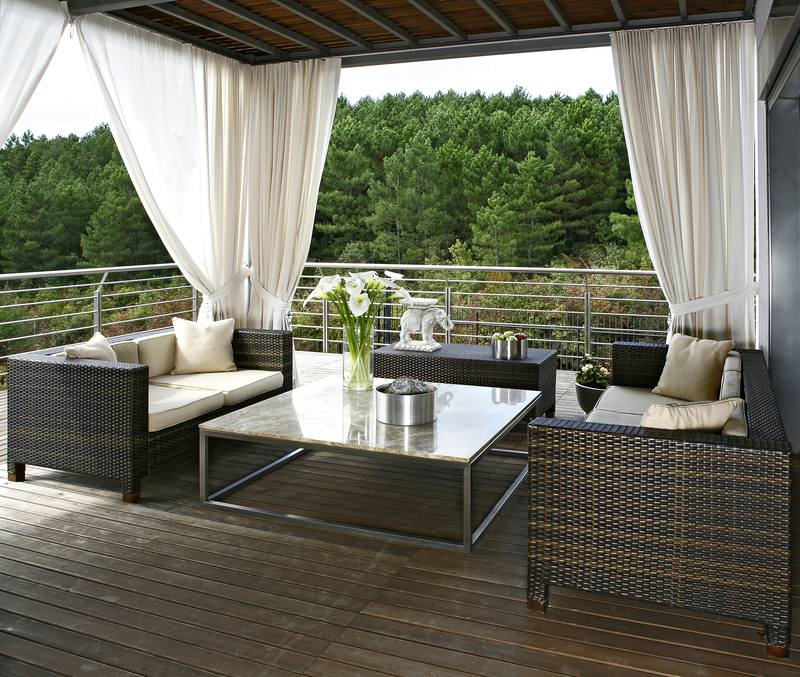Nurturing Calmness with Inspiring Zen Garden Spaces
Posted on 10/06/2025
Nurturing Calmness with Inspiring Zen Garden Spaces
In today's fast-paced modern world, nurturing calmness and promoting inner peace has become more essential than ever. Zen garden spaces offer a unique sanctuary, blending nature, spirituality, and simplicity to foster tranquility in everyday life. Whether you have a spacious backyard or a compact balcony, creating your own inspiring Zen garden retreat is both an art and a path to mindfulness.
What Is a Zen Garden?
A Zen garden, also known as a Japanese rock garden or karesansui, is a minimalist landscape that uses rocks, gravel, sand, and carefully selected plants to evoke a feeling of peace and contemplation. Originating in Japan's Zen Buddhist temples, these gardens are designed to inspire meditation, reflection, and harmony with the natural world.
Key Elements of Zen Gardens
- Stones: Symbolize mountains or islands, representing endurance and stability.
- Sand or gravel: Raked into patterns to mimic water and evoke a sense of flow.
- Plants: Carefully curated greenery adds subtle life and contrast.
- Water features: Optional elements that offer soothing sounds and a meditative ambiance.
- Bridges, lanterns, and statues: Traditional accents that enhance visual interest and spiritual meaning.
The synergy of these elements transforms any space into a haven of tranquility, helping you discover serenity amidst chaos.

Benefits of Zen Garden Spaces for Calmness
Paving the Path to Mindfulness
The deliberate design of Zen-inspired garden spaces naturally slows your thoughts and nurtures a calm state of mind. Observing patterns, arranging stones, and maintaining greenery encourages mindfulness--a cornerstone of stress reduction and emotional balance.
Promoting Physical and Mental Wellbeing
Creating and tending to a Zen garden supports both body and mind. The meditative act of raking gravel or pruning bonsai trees relieves anxiety, improves focus, and elevates overall mood. Breathing in fresh air while being surrounded by natural beauty helps regulate your nervous system, combating the impact of daily stressors.
Enhancing Your Living Spaces
Incorporating a Zen garden into your home or workplace:
- Provides a peaceful retreat for reflection and relaxation
- Improves air quality and fosters a connection with nature
- Adds aesthetic value and a sense of harmony to your environment
Designing Your Own Inspiring Zen Garden Space
You don't need to be a landscape artist to create a peaceful Zen environment. By focusing on simple principles and meaningful elements, anyone can nurture calmness with Zen garden-inspired spaces.
1. Choose the Perfect Location
- Outdoor Zen garden: Select a corner of your yard, patio, or rooftop.
- Indoor Zen garden: Use a tabletop, windowsill, or dedicated nook.
- Workspace Zen garden: Bring tranquility to your office desk with a mini Zen set.
The key is to pick a spot that invites stillness and is free from heavy traffic or distractions.
2. Define Your Space and Layout
- Boundaries: Use stones, wood, or edging to mark the garden area.
- Pathways: Curved gravel paths or stepping stones encourage slow, mindful movement.
Embrace asymmetry and simplicity--these principles align with the Zen philosophy of imperfection and balance.
3. Select Your Elements
- Rocks and boulders: Position them deliberately to represent mountains, islands, or symbolic forms.
- Gravel or sand: Spread evenly and rake into waves or spiral patterns to symbolize water or clouds.
- Greenery:
- Moss for lush serenity
- Bamboo or ornamental grasses for vertical accents
- Bonsai trees for miniature landscapes
- Water features: Miniature ponds or bubbling fountains add sound and movement.
- Decorative accents: Lanterns, stone pagodas, or Buddha statues infuse spiritual meaning.
4. Add Creative Personal Touches
- Wind chimes or bells: Soothing sounds enhance the sensory experience.
- Zen-inspired seating: Comfortable cushions or benches invite contemplation.
- Incense or scented candles: Introduce fragrant elements for deeper relaxation.
Personalizing your Zen garden sanctuary makes the space truly inspiring and uniquely yours.
Best Plants for Zen Garden Spaces
While minimalism defines Zen gardens, carefully chosen plants can elevate your design and reinforce an atmosphere of calm. Here are some ideal selections:
- Moss: Adds a lush, soft carpet and thrives in shaded, damp conditions.
- Bamboo: Symbolizes strength and flexibility, brings height, and soft rustling sounds.
- Japanese maple: Offers elegant foliage and seasonal color variations.
- Azaleas and camellias: Bring subtle floral beauty without overwhelming the space.
- Ferns: Delicate, feathery fronds soften edges and create visual flow.
- Pine trees or bonsai: Represent longevity and evoke miniature natural landscapes.
*Avoid overly bright flowers or complex arrangements, as simplicity is key to preserving Zen garden tranquility.*
Zen Garden Spaces: Tips for Maintenance and Mindfulness
Keep It Simple and Routine
- Rake gravel or sand regularly: Create new patterns as a meditative practice.
- Prune plants thoughtfully: Maintain clean lines and harmonious shapes.
- Check water features: Ensure gentle flow and clarity for optimal serenity.
- Remove debris: Keep the space uncluttered and calm.
Use Your Zen Garden for Daily Mindfulness
- Begin or end your day in your Zen sanctuary to set a calm tone or unwind.
- Meditate among the elements, using sights, sounds, and textures to anchor your attention.
- Practice gratitude by observing beauty in details--dewdrops on moss, the curve of a stone, gentle ripples in the sand.
By treating your inspiring Zen garden space as a living practice, you can nurture composure, clarity, and joy in your everyday routine.
Small Space Zen: Indoor and Tabletop Zen Gardens
Don't have a yard? You can still nurture calmness with a Zen garden-inspired space right inside your home. Miniature indoor Zen gardens are perfect for apartments, urban dwellers, or anyone seeking tranquility in a limited area.
DIY Mini Zen Garden Essentials
- Shallow tray or bowl: Acts as the base for your miniature sanctuary.
- Fine sand or gravel: Provides a soothing surface for raking creative patterns.
- Pebbles or small stones: Offer visual anchors and texture.
- Mini rakes: Allow you to change sand designs daily as a mindfulness ritual.
- Tiny figurines or lanterns: Add a personal or spiritual touch.
- Air plants, succulents, or small moss patches: Introduce subtle greenery that thrives indoors.
*A tabletop Zen garden can sit on a nightstand, study, or office desk, instantly transforming your environment into a source of peace and focus.*
How to Use Your Mini Zen Garden for Stress Relief
- Pause during work to rake sand patterns and reset your mind
- Practice slow, deep breathing as you arrange stones and plants
- Let your attention wander gently, using the garden as a focal point for micro-meditations
Famous Zen Gardens Around the World: Inspiration and Ideas
To spark your own creativity, consider studying world-renowned Zen gardens celebrated for their ability to nurture calm and simplicity.
- Ryoan-ji (Kyoto, Japan):
- Famed for its striking minimalist layout of fifteen stones placed in raked gravel.
- Daisen-in (Kyoto, Japan):
- Blends rocks, sand, and plants to symbolically depict the journey of a river.
- Portland Japanese Garden (Oregon, USA):
- Replicates traditional Japanese design, offering walking paths, ponds, and contemplative spaces.
- Zen Garden at Eikan-do (Japan):
- Known for stunning moss carpets and tranquil maple tree groves.
By exploring the philosophy and artistry behind these famous Zen garden spaces, you can uncover new ideas for your own calming oasis.

Frequently Asked Questions: Nurturing Calmness with Zen Garden Spaces
Can I create a Zen garden in a small apartment?
Absolutely! Even a small tray or tabletop Zen garden can promote calmness. Focus on minimalist design and simple elements to maximize tranquility.
Do Zen gardens require a lot of maintenance?
No, most Zen gardens are designed for low maintenance. Occasional raking, pruning, and cleaning are part of the meditative upkeep, not chores.
Which Zen garden element is most important for calm?
While every element contributes, the balance of stone, sand, and greenery is key. The process of arranging and caring for these components is what truly nurtures calmness.
Can Zen garden principles be applied to the interior design?
Definitely. Use natural materials, simple lines, and clutter-free surfaces to infuse Zen-inspired calmness throughout your living space.
Conclusion: Cultivating Peace with Inspiring Zen Garden Spaces
In a hectic world, nurturing calmness with Zen garden spaces offers profound benefits for the mind, body, and soul. The inspiring beauty of natural materials, paired with intentional simplicity, transforms any space into a personal sanctuary for meditation, reflection, and peace.
Whether you choose a sprawling outdoor haven or a miniature Zen retreat indoors, the principles of humility, harmony, and mindfulness remain at the heart of your experience. Spend a few moments each day connecting with your Zen garden, letting its serene energy inspire a calmer, more balanced you.
In crafting your own inspiring Zen garden space, you are not simply arranging stones and plants--you are nurturing a lifelong practice of tranquility and well-being.
- Embrace simplicity
- Honor nature
- Cultivate calm
Allow your Zen garden sanctuary to be a gentle guide, reminding you daily that peace is always within reach--one mindful breath, one raked pattern, one quiet moment at a time.
Latest Posts
Solutions for Soothing the Winds in Your Garden Sanctuary
From Lawn to Lounge: Designing Amazing Garden Seating Spaces
Nature's Playground: Building a Child-Friendly Garden Haven

